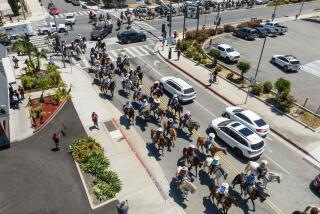Mounted Police : Patrol Riders Have a High View of Jobs
- Share via
SACRAMENTO — When they’re making their way through Capitol Park, weaving among the squirrels, trees and tourists, they seem like just a couple of guys on horses.
But should an emergency arise, Simon’s and Thumper’s ears perk up, their riders give the signs, and--as they say at the races--they’re off.
These are no ordinary horses and no ordinary riders, although Roy Sterling and Randy Puccetti, when separated from their steeds, look like other State Police officers who patrol the Capitol and the 40-acre park that surrounds it.
Ready for the Ride
They carry guns, of course, and wear traditional uniforms. But they also wear knee-high riding boots and spurs. They own their horses and ride up to 20 miles a day.
Some regulars around the park call them “the nice horse cops.”
“What you have is a 1,200-pound partner,” says Puccetti, 38. “No offense to Roy, but Thumper’s the best partner I could have.”
Sterling, 50, agrees. “Simon can hold his ground when 5,000 people carrying signs are walking toward him. This takes a special horse.”
The officers have been patroling the park on their horses a little more than a year.
It had occurred to Sterling, a three-year veteran of the State Police force, that officers on foot can cover only limited ground in the park, one of the state’s busiest. Tourists and transients, joggers and roller skaters use the park daily. Frequently there are demonstrations, political speeches and other crowd-drawing events.
Seeing It All
“It’s virtually impossible to cover by car,” Puccetti says of the grassy terrain. “Officers on bikes can cover a lot of ground, but they can see only the person in front of them. The advantage of being on a horse is that you’re 10 feet high and have a 360-degree view.”
But only a few horses can make the grade.
Sterling ticks off the qualifications: “He has to be sociable, he has to like attention, since he gets a lot of patting and stroking from strangers. He has to be level-headed and calm, and he has to be desensitized to noises and motions.”
Sterling scratches his head and says reflectively: “I equate this experience for a horse like you or me going to the moon. It’s a totally different environment.”
Horses, for example, hate skateboards, lawn mowers, electric clippers, traffic, big crowds, noisy people and the sound of crunching aluminum cans--all of which are heard regularly in Capitol Park.
After months of training, Simon and Thumper handle all of that and more, Sterling says. “Every day is a training day. There’s always something to review.”
“They develop a lot of trust in us,” Puccetti says. “They do things most horses wouldn’t do.”
Rear-End Solution
If, for example, an officer wants to move a crowd away from a building, he directs his horse to put his nose to the building and make a half pass--or swing his rear end around. “Clears ‘em right away,” Sterling says.
On the other hand, tourists and others often seem eager to make friends with the horses--a public relations plus.
“The horses have that diffusing advantage,” says Puccetti. “They break down those barriers between officers and other people.”
Sterling concurs. “People who wouldn’t wave down a squad car will talk to us.”
And Sterling says he remembers the day a group of Hell’s Angels motorcycle riders arrived at the Capitol to protest--successfully--legislation that would have required motorcycle riders to wear helmets.
“It was kind of strange to have them come up and ask to pat the horses,” Sterling recalls of the leather-clad riders. “We said they could, but we asked them to put out their cigarettes first. Cigarettes bother horses.”
More to Read
Sign up for Essential California
The most important California stories and recommendations in your inbox every morning.
You may occasionally receive promotional content from the Los Angeles Times.










